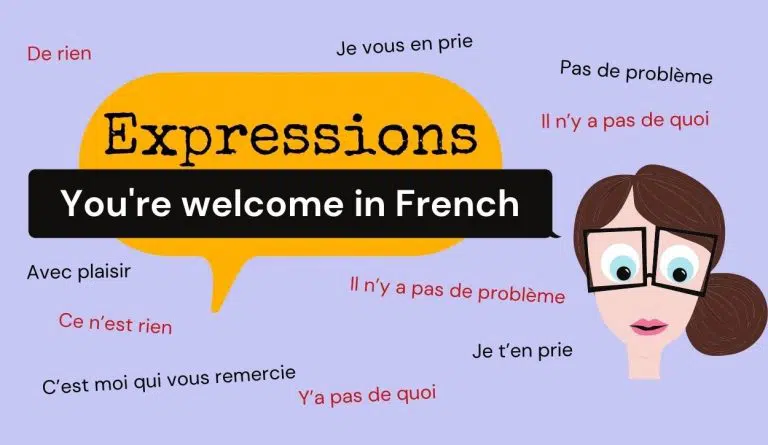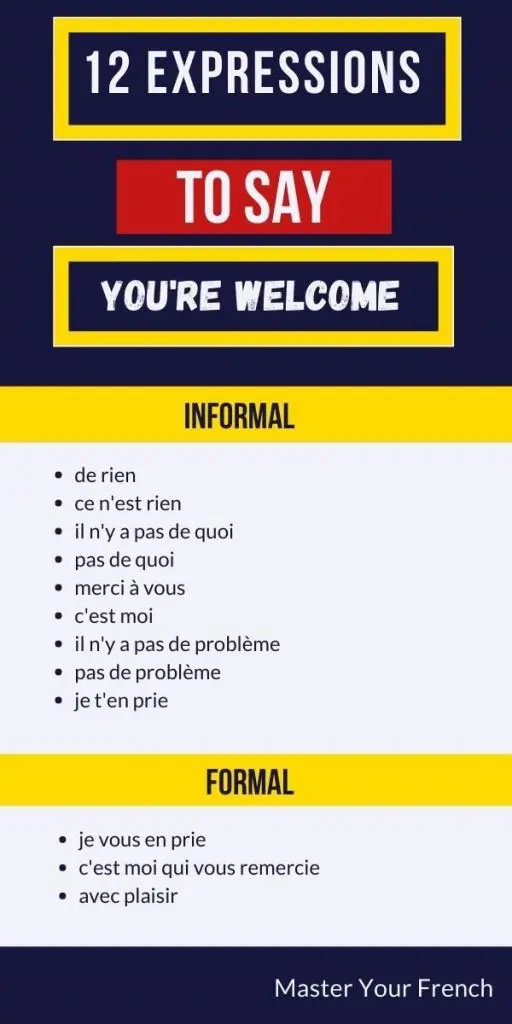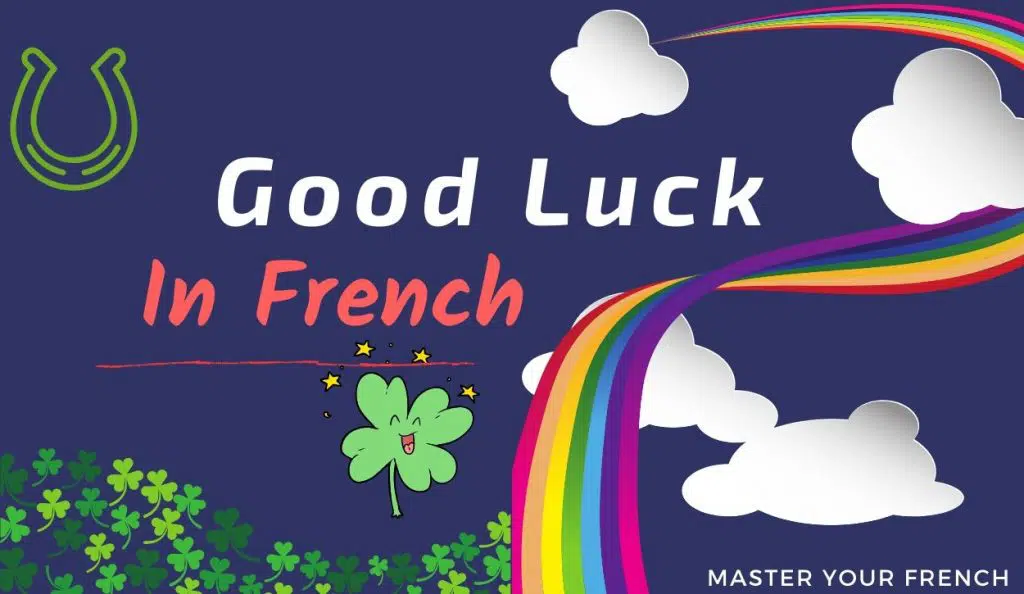12 Ways To Say You’re Welcome In French
Updated: March 5, 2021 by Mylene in French ExpressionsArray ▪

The most common way of saying you’re welcome in French is de rien. Would you like to learn more about how to say you’re welcome in French?
You’re Welcome In French
In this post, you’ll learn 12 expressions to say you’re welcome in French:
- De rien
- Ce n’est rien
- Il n’y a pas de quoi
- Y’a pas de quoi
- Il n’y a pas de problème
- Pas de problème
- Je vous en prie
- Je t’en prie
- Avec plaisir
- C’est moi qui vous remercie
- C’est moi
- Merci à vous
What is the origin of the word welcome?
The origin of the word welcome is wilcuma in Old English, a combination of wil (pleasure) plus cuma (guest). Apart from the origin of the word, many people wonder about its use in the English language:
When someone says, “thank you” in Spanish or French, the usual reply is “it’s nothing.” Why do we say “you’re welcome” in English?
In French, a common reply to thank you is de rien. In Spanish, it is “de nada”.
For the English Language, you can read the detailed answer of the journalists Patricia T. O’Conner and Stewart Kellerman to this question.
Replying to thank you
In our daily conversations and our day-to-day life, we encounter situations where a polite reply is needed. For example, when someone thanks you, what would you answer? Or when someone says thank you for holding a door open, what would you answer?
You probably know that thank you in French is merci, but how to reply to thank you?
You only have a few seconds to answer. And you have to reply with the appropriate form of “you’re welcome”.
You’re welcome and its alternatives
The image below illustrates the 12 most used expressions to say you’re welcome in French.
To read more on similar expressions, like how to wish good luck in French, check our brief guide to learning useful French expressions.

Whenever someone thanks you, it’s important to know exactly which form of “you’re welcome” to respond with.
I know this can be very stressful for non-natives:
- Is your answer polite enough?
- How to say that you were happy to help?
- Do you know a polite way to say you’re welcome in French?
- Do French people actually use the expression that you know?
Don’t worry!
As I’ll explain, you can substitute the use of you’re welcome with other terms that suit better the situation.
So, let’s see, in the next section, when to say “you’re welcome” and how to use its variants?
How to say you’re welcome in French?
In this section, I’ll outline the various ways of saying you’re welcome in French.
Truly to its source and a way from these new trends, like seizing unnatural opportunities in using you’re welcome, I’m going to show you the real use of this you’re welcome in the French language.
De rien
De rien means “there is nothing to thank for”.
This is the most common way of saying “you’re welcome” in French. It minimizes the reason why someone is thanking you in the first place. Consider this casual exchange with a friend:
- A friend: Merci pour votre conseil
- You: De rien !
Ce n’est rien
Ce n’est rien is another way to say de rien.
You can swap its use with de rien. This means “this is nothing”. Easy right?
Maybe if you listen to French people, you will certainly hear the next one…
Il n’y a pas de quoi
Il n’y a pas de quoi sometimes abbreviated in y’a pas de quoi.
The meaning is: “don’t mention it”. This is another very informal phrase, most likely to be heard among friends and family.
Il n’y a pas de problème or pas de problème
Most likely it comes from the English expression no problem or pas de problème are a quick and easy ways to say you’re welcome in informal situations.
It’s more casual than “Il n’y pas de problème“.
Je vous en prie
What can you say if you’re with a colleague, a client and a stranger?
To be polite, you have to use one of the following expressions: Je vous en prie or je t’en prie
This one is more formal than the others, and it is a pretty common way to say you’re welcome in French. It can be equivalent to “don’t worry about it”.
This is the most heartfelt way of saying you’re welcome, without expressing something like “it was my pleasure”.
You have to use je vous en prie with a stranger or je t’en prie with a friend.
Avec plaisir
Avec plaisir translates literally to “with pleasure”.
You should use this expression if you want to say you’re welcome to someone, AND you would also like to mention that you’re happy to have done whatever you did.
While de rien can be a somewhat automatized response to merci, je vous en prie signals that the speaker really understands that the other person is truly thankful and that he is truly welcome.
C’est moi qui vous remercie
C’est moi qui vous remercie, c’est moi or merci à vous.
When translated literally we get: “it’s me who thanks you”.
C’est moi qui vous remercie is best used in situations when the person saying you’re welcome really feels that they should be the one saying thank you.
The short forms c’est moi is more common and is easiest to use. Why? Just because it’s shorter!
You can use as well merci à vous which means thanks to you.
The different meanings of You’re welcome
Welcoming someone or replying with a welcome gesture is common in various cultures and in different languages, including English and French. Today, it has become commonplace, to say you’re welcome not only as a reply to thank you.
In When Did ‘You’re Welcome’ Become a Gloat?, an article published in the New York Times Magazine, it is reported how politicians, commercials, sports players, and comedians have been using “you’re welcome” creatively.
No need to thank me
In many situations, the meaning of this expression shifted from a generous context to a stand-alone expression to signal “No need to thank me. I already know how great I am“.
A punch line
More recently, you’re welcome became an efficient tool used by advertisers as a promotional technique or by comedians as a punch line.
Absurd surprise
On social media, you’re welcome, when added to a tweet, it can be translated to “you would never think to ask for this, but here is an endearing, absurd surprise”.

Question
Now, imagine someone saying thank you for holding a door open, what would you answer?
Thank you!
You don’t have to use these 12 ways. I recommend you pick one expression.
I propose to choose je vous en prie.
It’s better to be more formal than to offend someone, right?
Merci for reading my article!
Would you like to be notified whenever a new post goes out?
If so, be sure to subscribe to the newsletter so that you won’t miss similar language tips updates. You can also follow me on YouTube with a lot of free learning material to help you boost your French language skills.
Array

Mylene,
Merci beaucoup pour Votre article sur l’expression “de rien”. Je vais lir et écouter Votres leçons françaises.
Bonjour David, je vous remercie beaucoup pour votre message. Je vous souhaite un bel apprentissage. A bientôt ! Mylène
I am eager to re-learn French, a language I studied all my years in school and college. Far too much I have forgotten. Each lesson is like finding an old ami.
Hello Peggy! Thank you for the comment. A très bientôt!